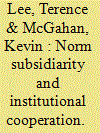|
|
|
Sort Order |
|
|
|
Items / Page
|
|
|
|
|
|
|
| Srl | Item |
| 1 |
ID:
140339


|
|
|
|
|
| Summary/Abstract |
This article engages with peace and security in Africa. Peace and security policy constitutes the main focus of cooperation between the European Union and the African Union under the 2007 Joint Africa–European Union Strategy and the current Roadmap 2014–2017. Peace and security is a major topic because, according to the Conflict Barometer 2014, Africa remains the most conflict-prone continent in the world. In the past two decades, various actors, including the United Nations, Africa's Regional Economic Communities, the European Union, ad hoc coalitions and individual states have launched a large number of peacekeeping operations in Africa. Despite some successes, there have also been significant failures and challenges. Consequently, there is an ongoing debate about peacekeeping in Africa and the participation of the European Union in supporting such operations. While the ‘African solutions to African problems’ agenda emerged in the early 2000s out of the perceived failures of the 1990s, the African Union has not, however, always lived up to the hopes. Subsequently, the United Nations has continued to play a major role in peacekeeping in Africa. In fact, the existing literature has neglected the important role of the United Nations with regard to European Union–African Union cooperation in general, including in the area of peace and security. A lot of the issues addressed in the Joint Africa–European Union Strategy, including its focus on peace and security, are related to the United Nation's agenda. Hence, this article will also demonstrate that, due to the major role played by the United Nations in European Union–African Union peacekeeping activities, making it without doubt an inseparable part of the European Union–African Union partnership, it is more appropriate to speak of an African Union–European Union–United Nations nexus. Last but not least, important lessons for regional, interregional and multilateral cooperation can be deduced from this innovative African Union–European Union–United Nations nexus. These include the need for the three actors to play to their strengths, making important and specific contributions, which, when combined, complement those of their partner institutions.
|
|
|
|
|
|
|
|
|
|
|
|
|
|
|
|
| 2 |
ID:
141622


|
|
|
|
|
| Summary/Abstract |
Given competing interests among the three littoral states of Malaysia, Singapore and Indonesia, what explains the nature and timing of their cooperative arrangement in combating maritime piracy in the Straits of Malacca in the post-2004 period? This observation is especially puzzling because the material and strategic interests of these actors generally did not change during the time period that witnessed increased cooperation. We argue that key developments of the anti-piracy regime in the Straits of Malacca cannot be fully explained by rationalist approaches, which traditionally stresses material and national interests of states. By critically engaging constructivist approaches, this paper posits that Malaysia, Singapore and Indonesia engaged in a process of norm subsidiarity. Through norm subsidiarity, relatively weak states get together to develop their own rules to prevent their exclusion or marginalization from institutions of global governance by more powerful actors. The littoral states engaged norm subsidiarity to resist extra-regional attempts to manage piracy in the Straits of Malacca. These extra-regional security proposals triggered a powerful regional cognitive prior, providing the impetus for an indigenous response, leading consequently to a collective cooperative effort to deal with the threat of piracy.
|
|
|
|
|
|
|
|
|
|
|
|
|
|
|
|
|
|
|
|
|